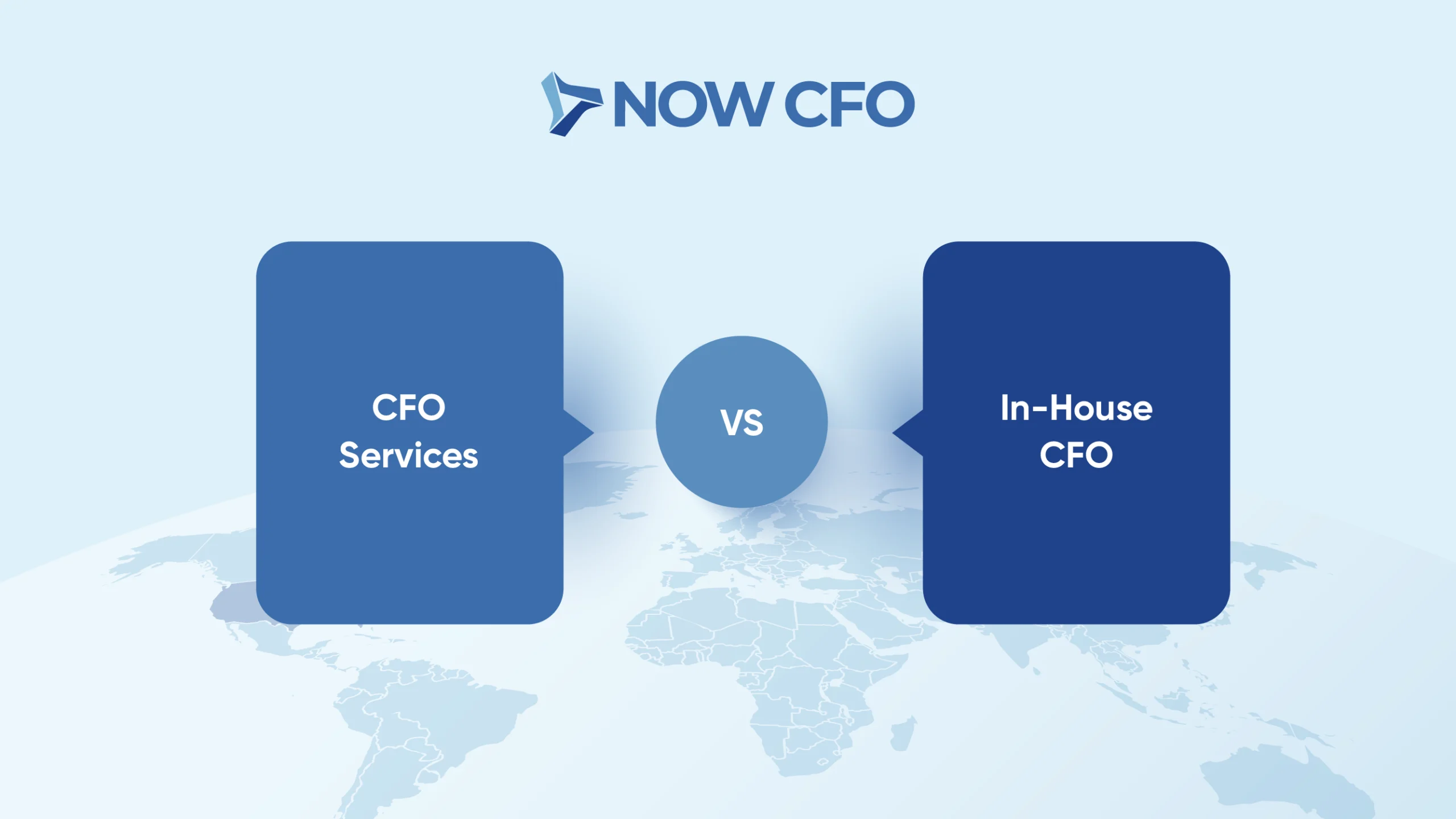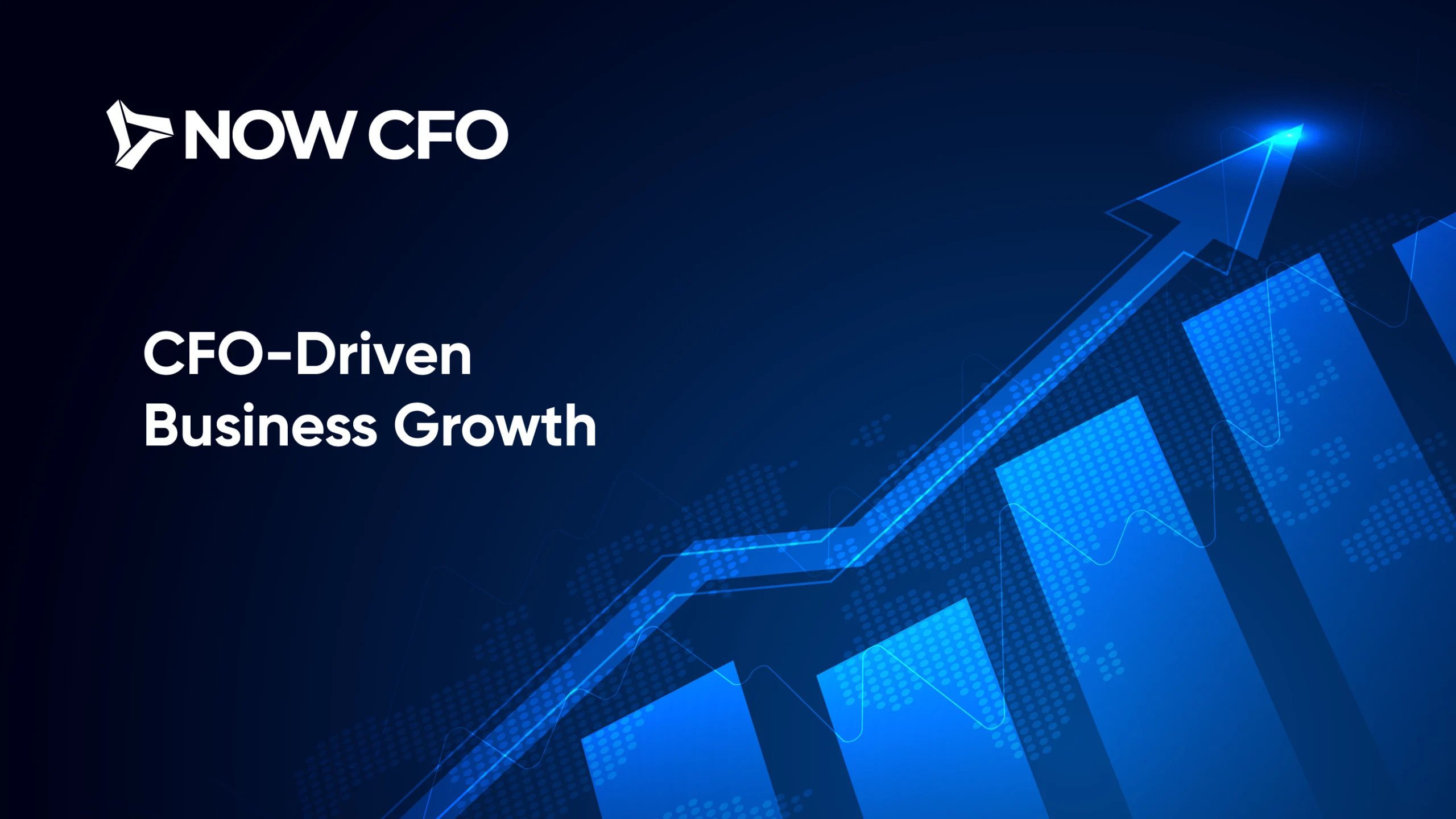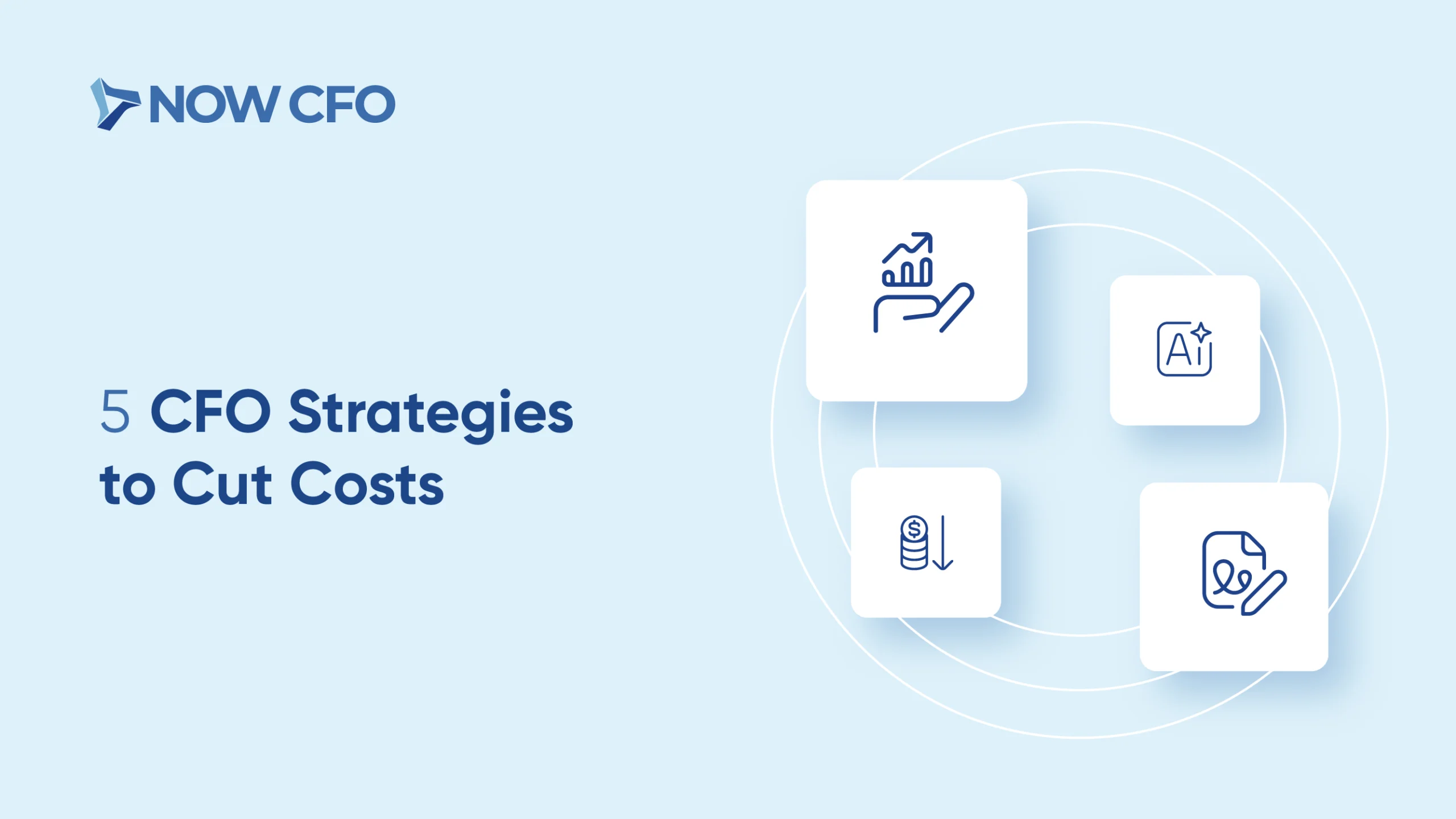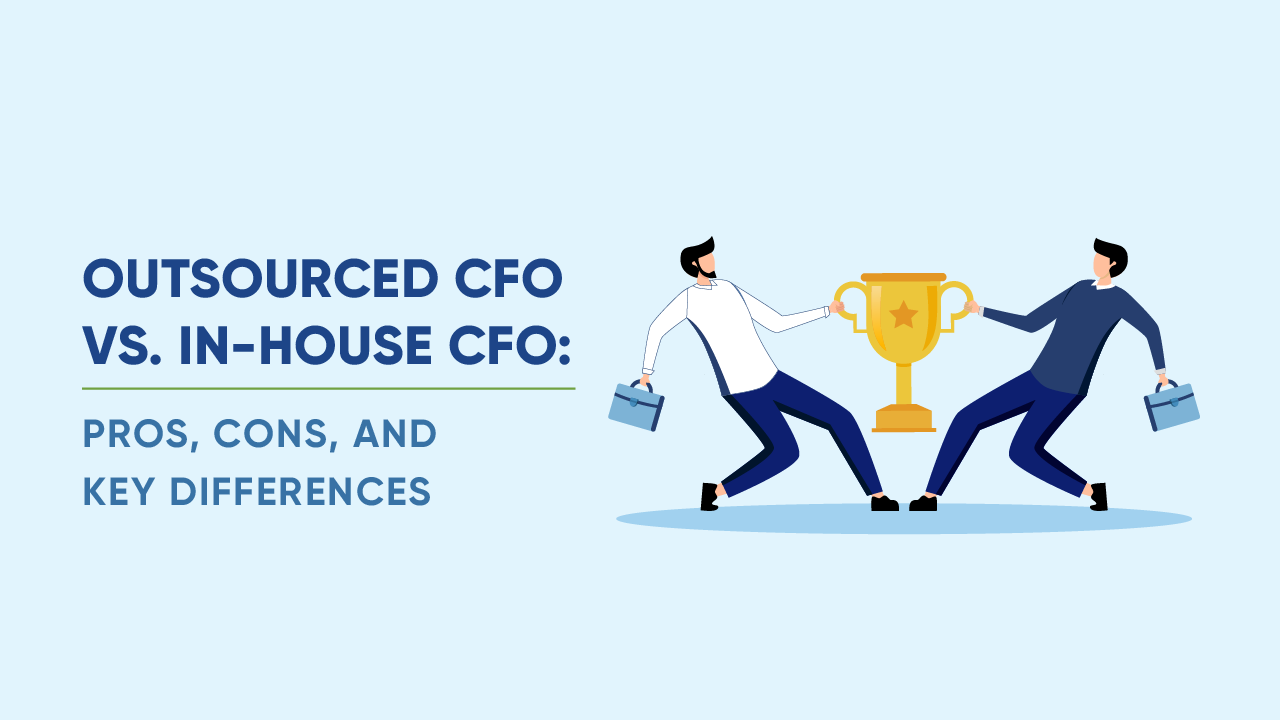
Small enterprises play a pivotal role in American business. As of 2024, the US boasts approximately 34.8 million SMEs, accounting for 99.9% of all U.S. businesses and employing 45.9% of the private workforce.
Effective financial leadership is crucial for these businesses. Choosing between an outsourced CFO and an in-house CFO can significantly impact a company’s financial health and strategic direction.
This decision hinges on various factors, including company size, economic complexity, and long-term goals. Let’s understand the difference between outsourced CFO vs in-house CFO.
Understanding the Role of a CFO in Business Success
The role of a CFO in business success has expanded significantly. No longer confined to traditional financial oversight, CFOs now serve as strategic partners, driving growth and innovation.
The Responsibilities of a CFO in Financial Management
At the core of a CFO’s duties lies comprehensive financial management. This encompasses overseeing cash flow, budgeting, financial reporting, and compliance with regulatory standards.
CFOs analyze financial data to identify trends, assess risks, and develop strategies that align with the company’s objectives.
Key responsibilities include:
- Financial Planning and Analysis (FP&A): Developing forecasts and budgets to guide decision-making.
- Risk Management: Identifying financial risks and implementing mitigation strategies.
- Compliance: Ensuring adherence to financial regulations and standards.
Why CFO Leadership is Critical for Business Growth
CFOs play a pivotal role in steering companies toward sustainable growth. Their financial analysis and strategic planning expertise enable them to make informed decisions that drive profitability.
For instance, CFOs assess investment opportunities, allocate resources efficiently, and identify cost-saving measures. Their insights are crucial in scaling operations and entering new markets.
Moreover, CFOs’ leadership in financial matters ensures that growth initiatives are financially viable and aligned with the company’s long-term goals. This underscores the importance of strategic financial leadership models for businesses.
Learn More: Outsourced CFO in business restructuring
How CFOs Influence Strategic Decision-Making
CFOs are integral to strategic decision-making processes. They provide data-driven insights that inform critical business choices like M&A, capital investments, and market expansion strategies.
CFOs evaluate the potential outcomes of various strategic options by leveraging financial models and scenario analyses. Their input ensures that decisions are financially sound and aligned with the company’s objectives.
This influence highlights the significance of CFO hiring strategies prioritize analytical and strategic competencies.
The Evolving Role of CFOs in Modern Businesses
The role of CFOs has evolved beyond traditional financial management to encompass broader strategic responsibilities. Modern CFOs are involved in digital transformation initiatives, sustainability efforts, and organizational leadership.
They collaborate with other executives to drive innovation, improve operational efficiency, and enhance customer experience. This evolution reflects the growing demand for fractional CFO vs full-time CFO models that offer flexibility and specialized expertise.
CFOs and Financial Crisis Management
In times of financial crisis, CFOs are at the forefront of managing the company’s response. They assess the financial impact of the crisis, develop contingency plans, and implement measures to preserve liquidity and solvency.
According to a BLS report, employment of financial managers, including CFOs, is projected to grow 17% from 2020 to 2030, much faster than the average for all occupations.
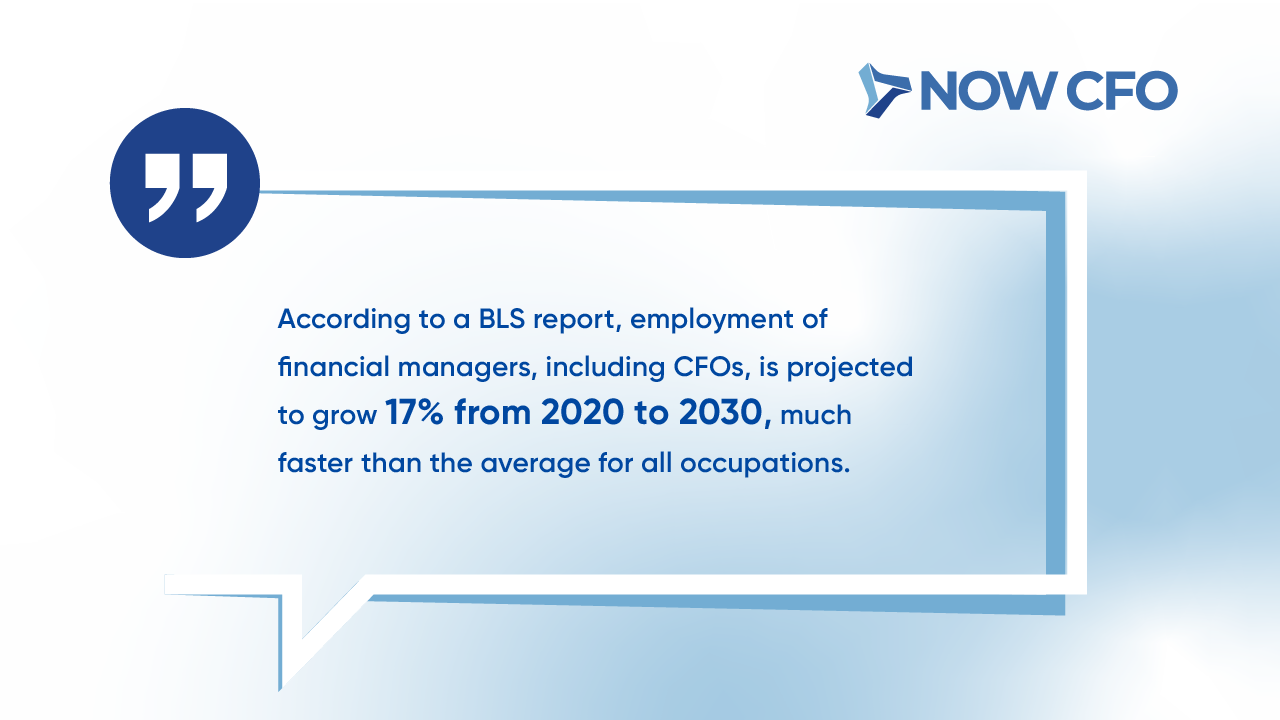
Key actions include:
- Cash Flow Management: Monitoring and optimizing cash reserves.
- Cost Control: Identifying and reducing non-essential expenditures.
- Stakeholder Communication: Providing transparent updates to investors and employees.
Learn More: What Does an Outsourced CFO Do?
Key Differences Between an Outsourced CFO and an In-House CFO
Selecting an outsourced CFO vs in-house CFO hinges on understanding their distinct roles and contributions. Each model offers unique advantages tailored to specific business needs.
Scope of Responsibilities and Level of Involvement
An in-house CFO typically engages deeply with the company’s daily operations, overseeing comprehensive financial management, strategic planning, and internal team leadership. Their responsibilities often include:
- Developing and implementing financial strategies
- Managing internal finance teams
- Ensuring compliance with financial regulations
Conversely, an outsourced CFO provides specialized services on a contractual basis, focusing on specific financial areas such as:
- Financial forecasting and modeling
- Budgeting and cash flow management
- Preparing for audits or fundraising activities
Cost Comparison: Outsourced CFO vs. Full-Time CFO Salary
Financial considerations are pivotal when choosing between an outsourced CFO vs in-house CFO. The median annual wage of CFOs is $397,887 in Apr 2025.
In contrast, outsourced external CFO services offer cost-effective CFO solutions. Businesses can engage these professionals on a part-time or project basis, paying only for the services required. This model eliminates expenses related to:
- Full-time salaries
- Employee benefits
- Recruitment and training costs
Flexibility and Scalability in Financial Leadership
Business growth demands adaptable strategic financial leadership options. An outsourced CFO offers flexibility, allowing companies to scale services based on current needs. This model supports:
- Project-based engagements
- Interim leadership during transitions
- Scaling services up or down as required
Industry Expertise and Network Access
An outsourced CFO often brings a wealth of experience across various industries, offering insights and best practices that can be invaluable to a business. Their broad exposure allows them to:
- Implement proven financial strategies
- Introduce innovative solutions
- Leverage a network of industry contacts
This access can benefit companies seeking CFO outsourcing for startups and mid-sized businesses, where diverse experience can drive growth.
Level of Control and Direct Management
Maintaining control over financial operations is a significant consideration. An in-house CFO offers direct oversight, immediate availability for decision-making, and seamless integration with the executive team.
In contrast, an outsourced CFO operates independently, which may lead to:
- Limited availability for spontaneous meetings
- Potential delays in communication
- Less familiarity with internal processes
Pros and Cons of Hiring an Outsourced CFO
Understanding the advantages and potential drawbacks of outsourced vs in-house CFO is crucial when evaluating the decision. These insights can help determine when to hire an outsourced CFO.
Benefits of an Outsourced CFO for Business Growth
An outsourced CFO brings a wealth of experience and strategic insight, often acquired across various industries. This broad perspective enables them to implement best practices and innovative solutions tailored to your business needs.
Key virtual CFO benefits include:
- Strategic Financial Planning: Crafting long-term financial strategies aligned with business objectives.
- Scalability: Adjusting services based on business growth stages.
- Access to Networks: Leveraging industry contacts for financing and partnerships.
How Outsourced CFOs Improve Cost Efficiency
Engaging an outsourced CFO can lead to significant cost savings compared to hiring a full-time executive. According to GrowthForce, while vCFO support services cost an average of $5,000 to $12,000 monthly, the average base salary of an in-house CFO is approximately $441,105 per year.
Cost-saving aspects:
- Reduced Overhead: No benefits, bonuses, or office space expenses.
- Flexible Engagements: Pay only for the services you need.
- Efficiency: Streamlined financial processes reduce waste and errors.
Access to Experienced Financial Experts Without Full-Time
An outsourced CFO provides access to high-level financial expertise without the commitment of a full-time hire. This model is particularly beneficial for businesses that require strategic guidance but cannot justify the expense of a permanent CFO.
Advantages:
- Expertise: Benefit from seasoned professionals with diverse industry experience.
- Flexibility: Engage services as needed, aligning with business cycles.
Potential Challenges of an Outsourced CFO Model
While there are numerous benefits, the outsourced CFO model may present particular challenges:
- Limited Availability: Shared commitments can affect responsiveness.
- Integration: External professionals may require time to understand company culture.
- Continuity: Potential for turnover if the outsourced CFO moves on.
Finding the Right Outsourced CFO for Your Business
Selecting the appropriate outsourced CFO involves careful evaluation:
- Experience: Seek professionals with relevant industry backgrounds.
- References: Verify past performance and client satisfaction.
- Alignment: Ensure their approach aligns with your business goals.
Utilizing resources like NOW CFO’s guide on finding the right outsourced CFO can aid in this process
Pros and Cons of Hiring an In-House CFO
When evaluating the choice between an outsourced CFO and an in-house CFO, it’s essential to understand the unique advantages and challenges of hiring a full-time, dedicated financial executive.
Benefits of a Dedicated, Full-Time CFO in Your Business
An in-house CFO offers several advantages:
- Deep Organizational Insight: Being embedded within the company provides a comprehensive understanding of internal operations and culture.
- Immediate Decision-Making: Availability for on-t-spot financial decisions and strategic discussions.
- Consistent Leadership: Provides stability and continuity in financial management and planning.
How an In-House CFO Enhances Internal Financial Strategy
An in-house CFO plays a pivotal role in shaping and executing the company’s financial strategy:
- Customized Financial Planning: Develops tailored financial plans aligned with company goals.
- Cross-departmental collaboration: Works closely with other departments to ensure financial considerations are integrated into all aspects of the business.
- Proactive Risk Management: Identifies potential financial risks and implements mitigation strategies.
The High Cost of Hiring and Retaining a Full-Time CFO
Hiring an in-house CFO involves significant financial commitment:
- Salary and Benefits: The median annual wage for CFOs is $397,887 as of April 2025.
- Recruitment and Onboarding Costs: Expenses related to hiring processes and training.
- Long-Term Commitments: Obligations such as severance packages and retirement benefits.
Limited Industry Exposure Compared to an Outsourced CFO
An in-house CFO may have limited exposure to diverse industries and financial practices:
- Narrow Perspective: Experience confined to a single industry or company.
- Potential for Stagnation: Less opportunity to learn innovative financial strategies employed elsewhere.
Balancing Control vs Cost in CFO Hiring Decisions
Deciding between an outsourced CFO vs an in-house CFO involves weighing control against cost:
- Control: An in-house CFO provides direct oversight and immediate access, facilitating swift decision-making.
- Cost: This control comes with higher salary, benefits, and long-term commitment expenses.
- Flexibility: An outsourced CFO offers cost savings and flexibility but may have limited availability and less integration into the company culture.
How NOW CFO Provides a Competitive Advantage with Outsourced CFO Services
When evaluating the choice between an outsourced CFO and an in-house CFO, it is crucial to understand the unique advantages providers like NOW CFO offer. According to a Deloitte survey, 70% of businesses utilize outsourcing to reduce costs, highlighting the financial advantages of outsourced services.

Tailored Financial Solutions for Every Business Size
NOW CFO offers customized financial services that align with the specific needs of each business, whether it’s a startup, mid-sized company, or large enterprise. Our approach ensures businesses receive the appropriate financial oversight and strategy development level.
Key offerings include:
- Financial Forecasting: Developing projections to guide business growth.
- Budgeting: Creating and managing budgets to optimize resource allocation.
- Cash Flow Management: Ensuring liquidity and financial stability.DOL
Hands-On CFO Support Without Long-Term Commitment
Engaging with NOW CFO allows businesses to access experienced financial professionals without the obligations of a permanent hire. Our model offers:
- Flexibility: Services can be scaled up or down based on business needs.
- Cost-Effectiveness: Avoids expenses related to full-time salaries and benefits.
- Expertise: Access to professionals with diverse industry experience.
Advanced Financial Analysis and Reporting Capabilities
NOW CFO utilizes advanced tools and methodologies to deliver in-depth financial analysis and reporting. This includes:
- Real-Time Financial Dashboards: Providing up-to-date financial insights.
- Customized Reporting: Tailored reports that meet specific business requirements.
- Strategic Insights: Identifying trends and opportunities for growth.MIT Media Lab
Seamless Integration with Your Internal Finance Team
NOW CFO professionals work collaboratively with existing internal teams, ensuring a smooth integration into the company’s operations. This collaboration includes:
- Process Alignment: Adapting to existing workflows and systems.
- Knowledge Transfer: Sharing expertise to enhance internal capabilities.
- Team Support: Providing additional resources during peak periods or transitions.
Proven Success in Helping Businesses Scale Financially
NOW CFO has a track record of assisting companies in achieving financial growth and stability. Their support includes:
- Growth Planning: Developing strategies for expansion and scaling.
- Financial Structuring: Optimizing capital structures for efficiency.
- Risk Management: Identifying and mitigating financial risks.
Factors to Consider When Choosing Between an Outsourced CFO and an In-House CFO
When evaluating the decision between an outsourced CFO vs an in-house CFO, it’s crucial to assess various factors that align with your business’s unique needs and circumstances.
Business Size and Financial Complexity
The scale and intricacy of your business operations significantly influence the suitability of an outsourced CFO compared to an in-house CFO.
- Startups and Small Businesses Often benefit from outsourced CFOs who provide expertise without the overhead of a full-time hire.
- Mid-Sized Companies: May find value in outsourced CFOs for strategic projects or during transitional phases.
- Large Enterprises: Typically require in-house CFOs to manage complex financial structures and provide continuous oversight.
Budget Constraints and Cost Considerations
Financial resources are pivotal in deciding between an outsourced CFO and an in-house CFO. In-house CFO salary vs outsourced CFO costs differ as:
- Cost of In-House CFOs: Hiring a full-time CFO involves substantial expenses, including salaries, benefits, and overhead.
- Outsourced CFOs: Offer flexible pricing models, allowing businesses to pay for services as needed, which can be more economical, especially for startups and SMEs.
Need for Strategic Financial Planning vs. Day-to-Day Operations
Determining whether your business requires strategic financial guidance or daily financial management is essential when choosing between an outsourced CFO vs an in-house CFO.
- Strategic Planning Needs: Outsourced CFOs are ideal for businesses seeking high-level financial strategy, forecasting, and fundraising support.
- Operational Management: In-house CFOs are better suited for companies needing constant oversight of daily financial operations and internal team management.
Long-Term vs. Short-Term Financial Leadership Needs
Your business’s duration of financial leadership requirements influences the decision between an outsourced CFO vs in-house CFO.
- Short-Term Projects: Outsourced CFOs provide flexibility for temporary initiatives, such as fundraising rounds or financial restructuring.
- Long-Term Stability: In-house CFOs offer consistent leadership and are integral for businesses seeking sustained financial oversight and strategic development.
Access to Industry-Specific Financial Expertise
The requirement for specialized industry knowledge can dictate the choice between an outsourced CFO vs in-house CFO.
- Outsourced CFOs: Often possess diverse experience across various industries, providing broad insights and best practices.
- In-house CFOs: Offer deep expertise within a specific industry, which benefits companies operating in niche markets.
When Should a Business Opt for an Outsourced CFO?
Determining the right time to engage an outsourced CFO is pivotal for businesses aiming to enhance financial management without the commitment of a full-time executive.
Startups and Small Businesses with Growing Financial Needs
Startups and small enterprises often face resource constraints, making it challenging to hire a full-time CFO. Engaging an outsourced CFO provides access to high-level financial expertise tailored to the company’s growth stage.
Benefits include:
- Strategic Planning: Developing financial strategies aligned with business goals.
- Cash Flow Management: Ensuring liquidity for operations and growth.
- Investor Readiness: Preparing financial statements for potential investors.
Companies Looking to Reduce Overhead Costs
Reducing operational expenses is a priority for many businesses. Outsourcing CFO services eliminates the need for a full-time salary, benefits, and associated costs.
Advantages:
- Flexible Engagements: Pay for services as needed.
- Access to Expertise: Benefit from seasoned professionals without long-term commitments.
- Resource Allocation: Redirect savings to core business areas.
Businesses Needing High-Level Expertise on a Flexible Basis
Certain situations require specialized financial guidance without the permanence of a full-time hire. Outsourced CFOs offer expertise in mergers, acquisitions, or financial restructuring.
Key services:
- Due Diligence: Assessing financial health during acquisitions.
- Restructuring Plans: Developing strategies for financial turnaround.
- Interim Leadership: Providing temporary oversight during transitions.
Organizations Undergoing Mergers, Acquisitions, or Expansions
During significant organizational changes, financial complexity increases. An outsourced CFO brings experience in navigating these transitions effectively.
Support includes:
- Financial Modeling: Projecting outcomes of mergers or expansions.
- Risk Assessment: Identifying potential financial pitfalls.
- Integration Planning: Aligning financial systems post-merger.
Engaging an outsourced CFO during such periods ensures informed decision-making and smooth transitions.
Companies Seeking to Strengthen Financial Reporting and Compliance
Accurate financial reporting and adherence to regulations are critical. Outsourced CFOs specialize in establishing robust reporting systems and ensuring compliance with financial standards.
Services offered:
- Regulatory Compliance: Ensuring adherence to financial laws and standards.
- Internal Controls: Implementing systems to prevent financial discrepancies.
- Audit Preparation: Organizing financial records for external reviews.
When Does an In-House CFO Make More Sense?
Determining the optimal time to appoint an in-house CFO hinges on several critical business factors. This section delves into scenarios where having a dedicated, full-time CFO is advantageous.
Large Enterprises with Complex Financial Structures
As businesses expand, their financial operations become increasingly intricate. An in-house CFO is essential for navigating these complexities, providing strategic oversight, and ensuring financial stability.
Key responsibilities include:
- Financial Strategy Development: Crafting long-term financial plans aligned with corporate goals.
- Risk Management: Identifying and mitigating financial risks.
- Regulatory Compliance: Ensuring adherence to financial regulations and standards.
Businesses Requiring Direct Financial Oversight Daily
Companies with daily financial transactions and operations benefit from the constant presence of an in-house CFO. This role ensures real-time financial monitoring and swift response to any issues.
Advantages include:
- Immediate Decision-Making: Quick resolution of financial matters.
- Continuous Monitoring: Ongoing oversight of cash flow and expenditures.
- Team Leadership: Direct management of the finance department.
Companies Planning for Long-Term Financial Leadership Stability
An in-house CFO offers consistent financial leadership for organizations aiming for sustained growth. This stability is crucial for executing long-term strategies and achieving financial objectives.
Benefits encompass:
- Strategic Continuity: Maintaining a consistent financial vision.
- Stakeholder Confidence: Building trust with investors and partners.
- Organizational Alignment: Ensuring financial goals align with overall business strategy.
Organizations with Multiple Revenue Streams and International Operations
Companies operating across various markets and countries face complex financial challenges. An in-house CFO is pivotal in managing these intricacies effectively.
Responsibilities include:
- Currency Management: Handling foreign exchange risks.
- Regulatory Navigation: Complying with diverse international financial regulations.
- Consolidated Reporting: Integrating financial data from multiple sources.
Businesses Focused on Deep Internal Collaboration
An in-house CFO plays a central role in organizations where cross-departmental collaboration is vital. Their presence facilitates the seamless integration of financial strategies with other business functions.
Collaborative roles involve:
- Interdepartmental Coordination: Aligning financial plans with operational activities.
- Strategic Input: Contributing to company-wide decision-making processes.
- Cultural Integration: Embedding financial awareness within the organizational culture.
Conclusion: Choosing the Right CFO Model for Your Business
Selecting the right financial leadership model is a strategic decision that can shape your company’s future. Whether you opt for an outsourced CFO or an in-house CFO, assessing your business’s unique needs and resources is imperative. For more insights, check out our Outsourced CFO vs full-time CFO article.
An outsourced CFO offers flexibility and specialized expertise, making it an attractive option for many small to mid-sized companies.
If you’re considering this path, NOW CFO provides tailored outsourced CFO services to meet your requirements. Schedule a free consultation to explore how our solutions can benefit your business.




